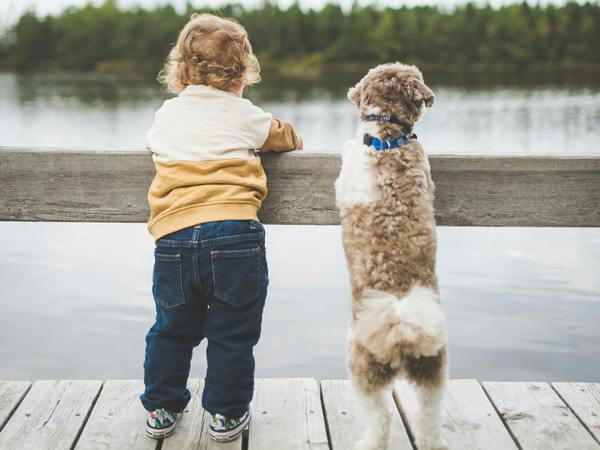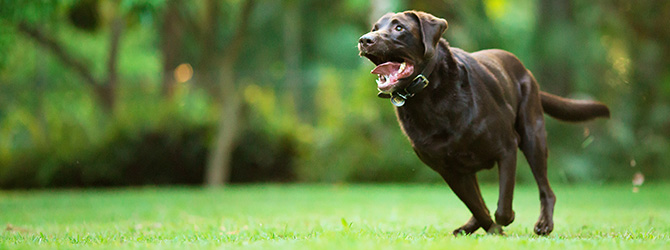19 fascinating facts about dogs
First Published: 24/08/2018
Last Updated: 03/05/2024
As a dog lover, you know there’s something special about your canine companion — and scientists agree. Here are 19 fun facts about dogs that might surprise you.
1) Dogs dream like we do
Scientists believe dogs have similar sleep patterns to humans, and that small breeds of dog dream more than large breeds. Just as humans stir and twitch during REM sleep, dogs do the same. So if you’ve spotted your terrier twitching in his sleep, he’s probably dreaming.
2) Your dog’s sense of smell is between 10,000 to 100,000 times better than yours
His nose has millions more scent receptors than the average human, which is why dogs are sometimes used to sniff out drugs, explosives and even dead bodies. Carefully trained dogs can even be used to detect cancer cells in humans.
3) Just like a fingerprint, no two dog noses are alike
Every dog’s nose has its own pattern, and is as unique as a human fingerprint.
4) Touch is the first sense your dog develops
The first experience for a puppy after being born is being cleaned by his mother – a process that stimulates the nerve endings and gets the puppy’s blood flowing. From this moment onwards, touch is a vital part of socialisation, which helps the dog to bond with both humans and other dogs.
5) Your dog is as smart as a toddler
Scientists have found that most dogs have the intelligence of a two-year-old child. As well as understanding up to 200 words, they’re clever enough to manipulate humans and other dogs for reward. Of all the breeds of dog, border collies have been found to be the smartest.

Read more: Benefits of a dog health plan
6) Puppies are born deaf and blind
If you’ve ever seen a puppy being born, you’ll notice he’s born with his eyes closed. Newborn dogs are still developing, and most puppies open their eyes and begin to respond to noise after around ten days.
7) Your dog may have a sixth sense
Many dog owners have incredible stories to tell about how their dog appeared to have a sixth sense… in fact, according to a 2010 poll, a massive 67 per cent of pet owners reported their pets acting strangely before a storm, while as many as 43 per cent said their pup behaved oddly immediately before something bad happened. This has been utilised where some epileptic people can rely on their dog’s sixth sense can indicate if a fit is about to occur in their owner.
8) A one-year-old dog is as physically mature as a 15-year-old human
Though all breeds of dog age differently – with, for example, large dogs maturing faster than small ones – on average, a one-year-old pup has the same physical maturity as a 15-year-old teenager!
9) Your dog can smell your feelings
Feeling blue? Don’t be surprised to receive extra love and attention from your dog. Scientists have discovered that your pup can detect subtle changes in your scent, and can use this to determine how you’re feeling. In a similar way, dogs can sense certain bodily changes – such as illness, and even pregnancy – in their owners.
10) Your dog only sweats through his paws
Ever noticed that your dog’s paws are a little smelly? That’s unsurprising when you learn that dogs only sweat through their paws. While we humans have sweat glands over most of our bodies, your dog’s only sweat glands are located between the pads of his feet. For this reason, dogs cool down by panting with their mouths open, instead of sweating. A panting dog takes between 300 and 400 breaths each minute, compared to his usual 30 to 40.
11) Dogs can hear frequencies we can’t even imagine
Your dog’s hearing is not only sensitive but also capable of detecting sounds at much higher frequencies than the human ear can perceive. This incredible hearing ability makes them invaluable in search and rescue operations, allowing them to hear cries for help that would be imperceptible to us.
Read more: What is gingivitis in dogs?
12) Dogs' wet noses enhance their sense of smell
Ever wonder why your dog's nose is always wet? Their nose secretes a special mucus that helps to absorb scent chemicals. This moisture helps them capture scents by dissolving the chemicals, which they then lick off to sample, enhancing their ability to determine what the smell is.
13) Some dogs are natural lifeguards
Newfoundland dogs are born swimmers with water-resistant coats and webbed feet, bred originally to help fishermen and rescue people from drowning. Their innate ability to perform rescues in water has saved numerous lives, making them the ultimate canine lifeguards.
14) The legendary intelligence of Border Collies
Regarded as one of the smartest dog breeds, Border Collies can learn over 1,000 different words and gestures. Their remarkable intelligence and agility make them excellent at problem-solving tasks and participating in competitive sports like agility trials.
15) Greyhounds outpace cheetahs over distance
While a cheetah's speed is legendary, a Greyhound can maintain a steady pace of 35 mph for up to seven miles, outstripping the cheetah in longer races. This endurance makes Greyhounds exceptional athletes in the canine world.
16) Dogs’ paws have a unique scent
Interestingly, the sweat glands in a dog’s paws produce a pheromone-laden oily substance, which can sometimes make their paws smell faintly of popcorn or cheesy crisps. This unique feature helps dogs mark their territory and communicate with other dogs.

Read more: Can dogs get colds?
17) The protective instincts of a right or left-pawed dog
Just like humans, dogs show a preference for using one paw over the other. Observing which paw your dog uses first can reveal their dominant paw, which is useful to know for training and understanding their behavior in various situations.
18) The illustrious history of dogs as companions and protectors
Dogs have been our companions for thousands of years, with evidence showing that breeds like the Saluki were kept as royal pets in ancient Egypt, valued for both their loyalty and their prowess as hunters.
19) Dogs’ role in human safety extends to health detection
Dogs with their acute sense of smell can be trained to detect various medical conditions, including changes in blood sugar levels and the presence of certain cancers. These medical detection dogs provide a vital service, alerting their owners to critical health issues before they become emergencies.
Need help or advice on dog ownership?
For expert advice on all things canine, get in touch with your local vet.
Find your nearest vet using our find a vet page, or speak to a vet online using our video vets service.


